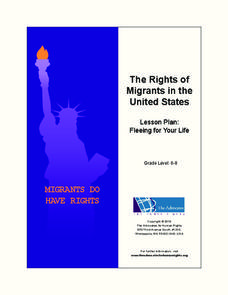Appalachian State University
Effective Feedback
Use this well-developed class period to introduce your junior high learners as to how to provide effective feedback concerning their classmates' writing. The plan includes a warm-up, review, introduction, guided and independent practice,...
Utah Education Network (UEN)
7th Grade Poetry: Metaphor Poem
The second lesson in a five-part poetry unit asks seventh graders to construct a metaphor poem. First, pupils examine Emily Dickinson's "The Railway Train" and identify the metaphor. They then select an object and an animal and craft a...
The New York Times
Revolt! Comparing Historical Revolutions
What elements are needed to have a revolution? How do historical revolutions from across the globe and generations compare with one another? This is an excellent activity that incorporates group work, source analysis, and an engaging...
Utah Education Network (UEN)
7th Grade Poetry: Ode Poem
Walt Whitman's "Captain, My Captain" and Robert Frost's "The Road Not Taken" provide seventh graders with examples of odes. After reading and discussing these and other examples, young poets craft an ode and respond to the ode of a...
John Wiley & Sons
Defining Leadership
Learners use their experience with leadership, as well as a thought-provoking quote and discussion with their classmates, to help them define the concept of leadership.
Utah Education Network (UEN)
7th Grade Poetry: Sonnet Poem
Two sonnets provide seventh graders with examples of Shakespearean sonnets. After discussing the story of the poems and analyzing their rhyme scheme and rhythm, young poets craft a Shakespearian sonnet and share their work with two...
Curated OER
Butterflies Fly!
Chopin was a lovely composer who played the piano masterfully. Third graders are introduced to Chopin, his piano sounds, triple meter, music patterns, movement, and the waltz. They listen to his music while hearing the story Butterflies...
Novelinks
The Joy Luck Club: Vocabulary Strategy (Magic Squares)
As part of their study of Amy Tan's The Joy Luck Club, readers engage in a magic squares vocabulary activity.
Advocates for Human Rights
The Rights of Migrants in the United States Lesson Plan: Fleeing for Your Life
A role-playing scenario has middle-schoolers imagining that they are refugees forced to flee their community and integrate into a new one. Then, some play the roles of members of the new community and the class brainstorms ideas about...
Biz Kids
Understanding Business Ethics
After screening an episode by BizKids, scholars show what they know about business vocabulary, then take part in grand conversations about role models and ethical dilemmas.
University of California
Impact of the California Missions on Native Americans
While the Spanish claimed to bring civilization to California indigenous peoples, in reality, they also brought violence and forced assimilation to European values. Primary sources, such as the reports of Catholic priests and Europeans...
Utah Education Network (UEN)
8th Grade Poetry: Sonnet Poem
The third lesson of five in an eighth-grade poetry unit has young scholars comparing Shakespearean sonnets with Petrarchan sonnets. To begin, they examine the different structures of the two forms and their different rhyme schemes. After...
Utah Education Network (UEN)
8th Grade Poetry: A to Z Poem
A two-part lesson asks eighth graders first to draw connections between the myth of Aengus and William Butler Yeats' poem "The Song of Wandering Aengus." In the second part of the lesson, writers craft an "A to Z Poem."
Curated OER
The Metamorphosis: DR-TA
Guide class members through Franz Kafka's The Metamorphosis with a series of questions designed for before, during, and after reading. Readers consider Gregor's situation and his options. In addition, they consider how they might rewrite...
Facing History and Ourselves
Tactics of Nonviolence
Students analyze the direct action tactics of nonviolence. As a class, they distinguish between a strategy and a tactic and identify tactics used during the civil rights movement. They relate these tactics and how they might be used to...
Curated OER
Communication, Day 2: Assertiveness
Having social skills and being able to assert yourself in a positive way is so important. Learners with mild to moderate disabilities engage in a series of activities to practice assertive communication and social skills. Perfect for a...
Google
Beginner 4: Searching for Evidence for Research Tasks
Having a strong searching skill set can make a research project much easier and much for successful for pupils. Tackle finding evidence with the ideas included here. The ultimate goal is for class members to learn the stepping stones...
Diablo Valley College
The Language of Sets and Set Notation
The basics of number theory and set notation are explained in a highly approachable way in a self-contained lesson and worksheet. Introducing the vocabulary and concepts from ground zero and building to more complex ideas of subsets and...
King Country
Lesson 9: Communication - Day 2: Assertiveness
Appropriate assertive and non-verbal assertive communication is the focus of this lesson plan designed for the special education classroom. Using mirrors, class members practice assertive responses to a variety of situations.
Curated OER
The Outsiders
Tenth graders complete a variety of activities related to the first two chapters of the book The Outsiders. They define metaphor, simile, idiom, and hyperbole, and take a vocabulary pre-quiz. In small groups, they write a character...
Illustrative Mathematics
Converting Decimal Representations of Rational Numbers to Fraction Representations
A rational number is a ratio of two integers. Discuss with your class how to convert the rational numbers of repeating decimals to fractions. A good commentary on letting x equal the repeating decimal and multiplying each side of such...
University of the Desert
Why Is Cultural Diversity a Positive Thing?
From more empathetic individuals to greater tolerance in government, learners explore the benefits of a culturally diverse world through a series of collaborative, discussion-based activities.
Curated OER
Investigating Our Past: Where Did Humans Come From?
Investigate the theories of human evolution. In this research based lesson, learners research and discuss how geographic isolation, interbreeding, generalization, and specialization are factors in the history of humans. Groups work...
Chymist
Visualizing pH
Why are acids and bases important in our daily lives? Lead the class in answering this question, among others, as they experiment with pH paper and classify where various substances belong on the pH scale. They also taste common acids...

























